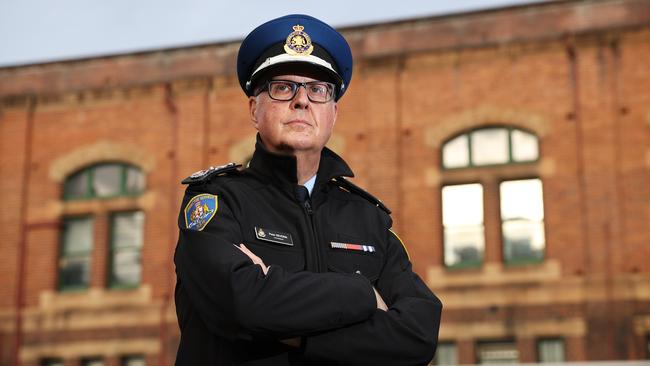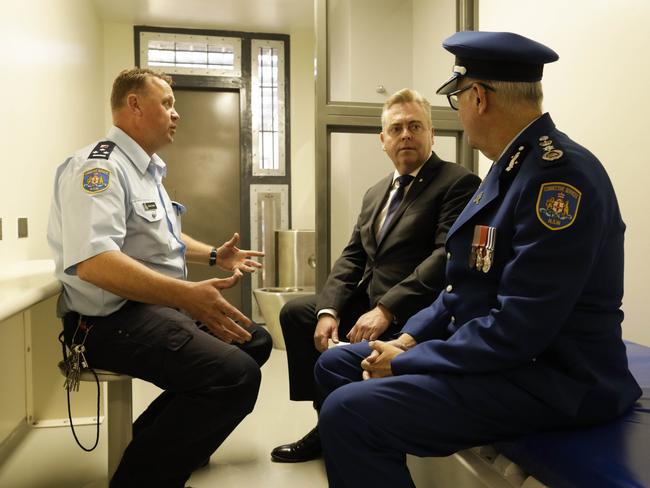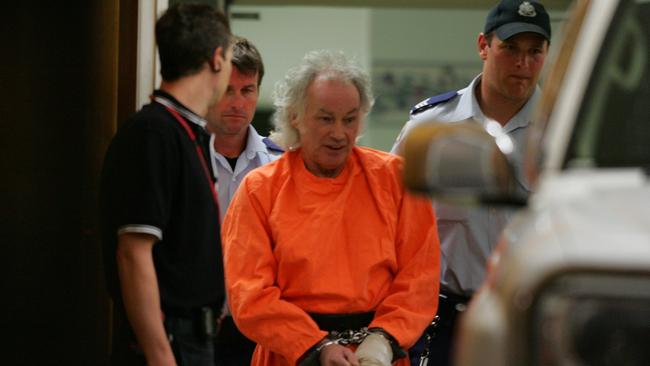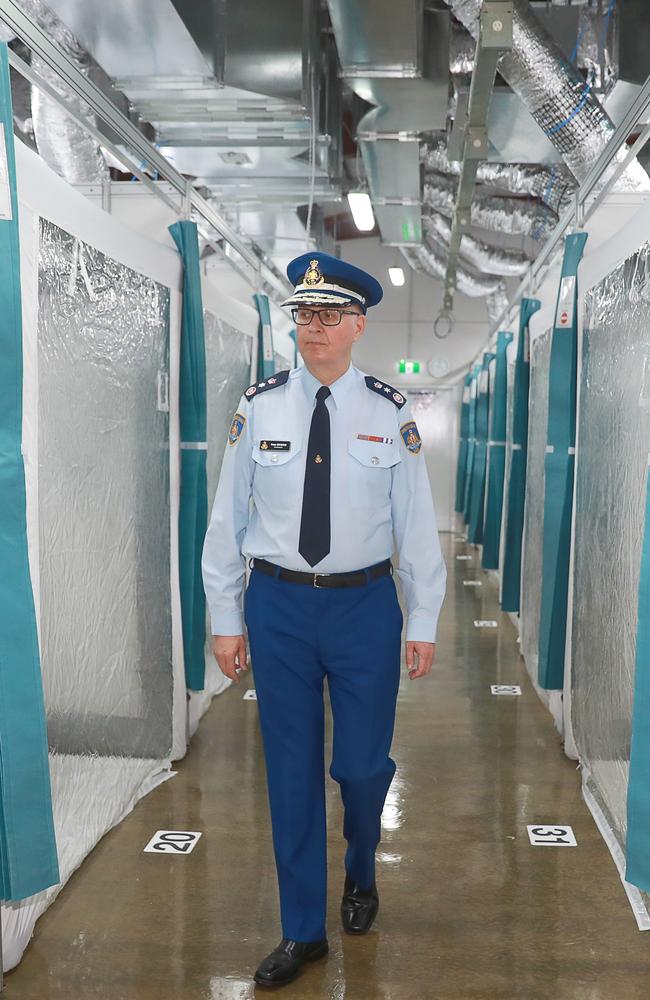Corrective Services NSW boss on retirement, right-wing extremism and Bassam Hamzy
On the eve of his retirement, NSW Corrective Services Commissioner Peter Severin has warned right-wing extremism will be the next challenging frontier for the prison system. We take a look back at his career which spans 41 years.
NSW
Don't miss out on the headlines from NSW. Followed categories will be added to My News.
White supremacists will be one of the greatest challenges for prisons in the future, the state’s outgoing Corrective Services boss has warned.
After more than four decades looking after prisons in three states and two countries, Commissioner Peter Severin will hang up his hat next week.
The 65-year-old, who has been in charge of the state’s 13,000 inmates since 2012, has taken an unapologetically tough stance during his tenure.
He lists his proudest achievements as creating 6000 additional beds to house a ballooning population, rolling out a smoking ban without sparking mass riots and managing a wave of extremist Islamic terrorism offenders.

But the father-of-one also sees the importance of giving inmates a chance to rehabilitate, take part in employment and become functioning members of society again.
Asked what the biggest challenge will be for his replacement, Mr Severin said managing the influence of right-wing extremism and the returned foreign fighters inside the prison system.
“In the terrorism space, clearly right-wing extremism is the challenge of the future, and that‘s what we’re focusing on already,” he said.
“The only challenge is that nobody really has an answer at the moment. And I‘m talking about the global nobody.
“Just because it is so difficult to discern between somebody or differentiate between somebody who just harbours really right-wing views and somebody who is willing to engage in violent behaviour as a result of that.
“They are not as obvious as the left wingers, the religiously motivated terrorists.”
There are currently 48 terrorism offenders in custody, including 30 convicted and eight on remand with a mix of al-Qaeda followers and Islamic State sympathisers.
Most are kept at Goulburn’s Supermax jail in a bid to prevent the radicalisation of other inmates in the wider population.

That includes Bassam Hamzy, who has influenced and manipulated other prisoners during his 20-plus years as the state’s most problematic inmate.
“I would suggest he’s one of the most dangerous people we have in custody in Australia and that is because he’s got reach,” Mr Severin said.
“He is somebody that I think will stay where he is right now for a long time to come.
“He hasn’t given me one signal in nine years that would give me any kind of comfort to move him anywhere else or to relax the regime that he is subject to.”
NSW currently runs a deradicalisation program — Proactive Integrated Support Model (PRISM) — for radicalised or at-risk inmates.
While many participants have had extremist Islamic leanings, it is understood a right-wing extremist and admirer of Adolf Hitler is currently signed up to the program.
Mr Severin believes deradicalisation works but the effort needs to involve family, psychologists, multicultural community groups and police.
“It‘s different to a sexual offender, for example, where we know exactly what to look out for,” he said.
“It’s the law enforcement agencies that need to identify (if) they are engaging in internet traffic that is dangerous? Are they doing things in terms of their environment and their connectivity with others that give rise to concern?”
TOUGH ACT TO FOLLOW
When Peter Severin worked as a prison boss in Queensland in the late 1990s, there was a notorious and daring escape on his watch.
So nimble and quick was the escapee that it left everyone, including prison staff, guessing how he pulled it off.
“It was the divine disappearance because he just literally was not there anymore and nobody could identify if he was alive or where he was,” the retiring prison veteran said.
In a twist of fate, Severin solved the great mystery a few years later, as he continued on his path to becoming one of Australia’s most experienced prison authorities.
“I was in South Australia at Mount Gambier prison,” he said. “And this guy came up to me and asked me about his extradition to Queensland … he said he had an escape up his sleeve there.
“I said before ‘I give you an answer, you have to tell me how you got out’. It cost me half my hair.”
Turns out the inmate’s short-lived freedom came at the cost of a broken ankle after scaling a prison roof, jumping off, escaping into a waiting friend’s car and making it across state borders.
“I got my story,” Mr Severin joked.
It is one of many the 65-year-old has amassed during his 41 years working inside correctional facilities.
On the eve of his retirement as NSW Corrective Services Commissioner, Mr Severin has reflected on a career looking after the worst of humanity and the role of jail in rehabilitating criminals.
Armed with a social work degree, and a will to help those less fortunate than him, he started as a prison guard at a large jail in Germany in October, 1980.
Coming from a family of doctors, it was an unusual career choice.
“Learning it from the ground up, it gave me a really good understanding of what prisons are like and how prisons operate,” he said. “Also the things you do and the things you don’t do.”
Leaving Germany as a Superintendent, Mr Severin migrated to Australia with absolutely no interest in stepping foot into another jail.
“Three months later, I was back,” he said.

He worked for Queensland Corrective Services for 15 years and the Department of South Australian Correctional Services for nine years.
He replaced Ron Woodham as the NSW Corrective Services Commissioner in 2012 and embarked on the biggest prison infrastructure program in Australian history.
He pinpoints creating 6000 extra prison beds, along with peacefully banning smoking in all jails and recently shifting a stubborn, upward trend in recidivism, as his proudest achievements.
The inmate demographic had changed a lot in the past 30 years, Mr Severin said, and the modern day prisoner was younger and more likely to be battling substance abuse and mental health issues.
“We’re dealing increasingly more with people who have significant drug and alcohol abuse issues, particularly with the synthetic drugs now like ice and so on,” he said.
“It’s very prevalent that that is associated with mental health issues.
“In many ways, you know, we are dealing with many, many offenders who 20, 30 years ago would be in mental health institutions.
“I’m not suggesting we should reopen mental health institutions.
“But it puts a focus or burden on the staff who are not trained to deal with some of the dysfunctionality that they’re experiencing every day.”

The influx of terrorism offenders also changed the dynamic in the prison yard.
In the early 2000s there was a small “dogmatic” group of al-Qaeda supporters locked up for homegrown terror plots. Then came the flood of Islamic State supporters, the likes of slain foreign fighter Khaled Sharrouf, who were criminals before they were terrorists.
The automatic response was to group the extremists together in a maximum-security prison south of Sydney so they couldn’t spread their dangerous views to anyone else.
That strategy has been divisive, with some experts arguing it simply allows the offenders to feed off each other’s radical views.
“We can get a lot of criticism for just isolating people,” Mr Severin said.
“But it’s not about that. If I let people out of Supermax into the greater system, they’ve got networks and they will use those networks for all the wrong reasons.”
For those who want to disengage from their radical views, there is a pathway out of Goulburn’s Supermax I and into the slightly-less restrictive, Supermax II.
Those jails have been home to notorious criminals like Bassam Hamzy, gang rapist Mohammed Skaf and the late serial killer Ivan Milat.

High-risk inmates are banned from speaking Arabic during phone calls and rotate cells regularly in a bid to monitor their every move.
Corrective Services came under fire recently when it emerged an extreme high-risk Supermax inmate was using his legal privilege calls to allegedly direct a drug ring and murder cover-up.
Mr Severin’s response was a plan to let an independent lawyer sit in on the legal calls to ensure the inmate was not using it to further his criminal empire.
But that was shot down as it overshadowed the principle of legal privilege.
“If that’s a constitutional right, we just have to be trying to be smarter and be one step ahead of it,” he said.
The prison population in NSW increased by 39 per cent between 2012 and 2019, according to research by the former Bureau of Crime Statistics and Research director, Don Weatherburn.
The rate of adult offenders committing another crime after being released had increased too, despite a government target to decrease recidivism rates by 5 per cent by 2023.
However, Mr Severin claimed figures from the past three quarters showed that was now trending down.
“We’re really looking at the evidence as to what does make a difference,” Mr Severin said. “So macramé weaving doesn’t make a difference, but if we teach somebody a skill that they can use outside in a meaningful way and pathways, that is one of the big, big opportunities in the future.”

Asked if prison was a place for rehabilitation and deterrence given the latest published figures showed 42 per cent of people who received a prison sentence reoffended within 12 months, Mr Severin replied “yes and no”.
“We can clearly say that the prisoner numbers have increased,” he said.
“That’s not necessarily because Corrective Services has failed.
“When you look at crime rates that go down in many cases, in many types of offences, and so the police are doing their job really effectively.
“And we’re working with that. We are actually seeing people come to prison who maybe wouldn’t have come to prison in the past.
“Yes, there has also been, through changes to bail laws, a tighter and tougher system that results in more people actually ending up on remand and so on.
“Balancing that against what we are trying to do has been challenging and the prisoner number increase has hit us.
“Not cold, but it ended up being quite a crisis.
“Until we started building and started to create environments that actually are much more conducive, again for people to engage and do something that will actually make a difference.”
Focusing less on locking people up and more on early intervention is one way of easing the pressure on the prison system, some in the criminal justice sphere have argued.
Mr Severin was cautious of weighing into the debate around de-penalising first-time drug possession offences in favour of pushing offenders into treatment programs.
“From a societal point of view, I’m not one that is a strong supporter of harm minimisation for the wrong reasons,” he said.
“If there is something that actually makes sense instead of causing harm, that’s good.
“But if you just simply tolerate somebody having drugs in their possession without doing something that is proactive, I can’t necessarily see that that would be a benefit to society in the long term.”
Mr Severin will continue in his role as president of the International Corrections and Prisons Association.
Originally published as Corrective Services NSW boss on retirement, right-wing extremism and Bassam Hamzy





